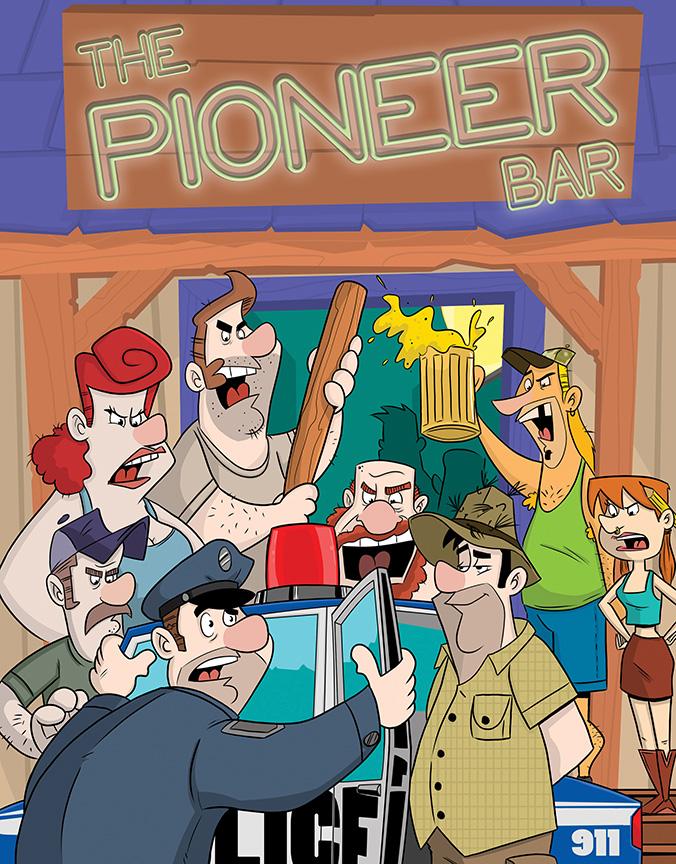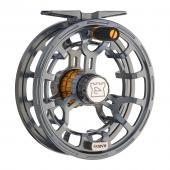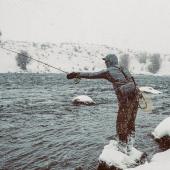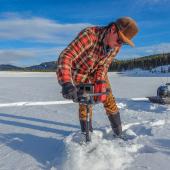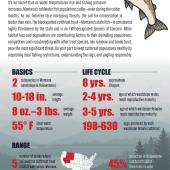Busted on the Bear Trap
Trophy trout, heavy-handed cops, and small-town hospitality. A Madison River fishing story. Kind of.
I leave early on this particular Friday, bumping into Boston Steve, whom I’d recently met. Steve’s a maniacal fly fisherman who moved to Bozeman for that reason; we became fast friends. I wouldn’t really get to know him until later that day, however.
It’s a perfect fall fishing day, overcast skies with occasional light rain and a little wind—the type of weather that provides a security blanket for aggressive brown trout fattening up before the long winter.
Steve’s an easy sell and he has a mid-’90s Mazda sedan with lots of miles on it. It’s good on gas, unlike my Durango, which funnels petroleum like Crystal Bar patrons downing their power-hour booze. We head to Bear Trap Canyon, cruising along Norris Rd. past light-colored wheat fields contrasted starkly with darkening gray skies—pure Montana.
Arriving at the river, we slide into waders, boots, and vests before rigging our rods. Steve drops down to the water and I watch him for a bit before wetting my own line. He’s into a plump rainbow in no time.
Walking the river with no particular urgency, I lazily take in the scenery while looking for trout in the usual riffles. I’m about to move on when I spot a big brown; he’s on the feed and I can see him moving a few feet from one side to the other, opening his big mouth.
I clip off a crayfish but keep the midge I’d tied below it, dropping off a size-14 Griffith’s gnat instead. I put a number of casts down as gently as possible and watch the midge float directly in front of him. He doesn’t take it. I switch the dropper a few more times, getting refusals on a prince nymph, size-16 hare’s ear, and an 18 micro mayfly. Proven producers all rejected.
I figure the brown is 21-23 inches. He’s comfortable and feeding on nymphs of some sort. I’m scratching my head, wondering what the hell to do. I tie on my original nymph rig and cast sloppily about three feet to the brown’s right. The moment the cast lands, he jets. “Dammit!” I say to myself. “I spooked him,” I think momentarily, then reality sinks in: he was moving into position for the crayfish, which he eats. I am tied tight to the beast.
The fly rod is deeply bowed and pulsing as I try to keep him from going downstream. The line nearly breaks as he runs, ripping the slack through my fingers. My reel sings. He’s quick through a maze of boulder-strewn rapids and there’s no stopping him. I’m bobbing in deep water, half floating half bouncing downstream, stripping and reeling in line. The rod’s still doubled-over but there’s no pulsing now; he’s between two boulders and there’s no life to the bent rod. I’m sick as I figure he’s wrapped me around a boulder and will break the knot or come unbuttoned. I reel in the slack and grab the line with my hand to un-wedge my leader from between the two boulders when all hell breaks loose again—the brown is still on!
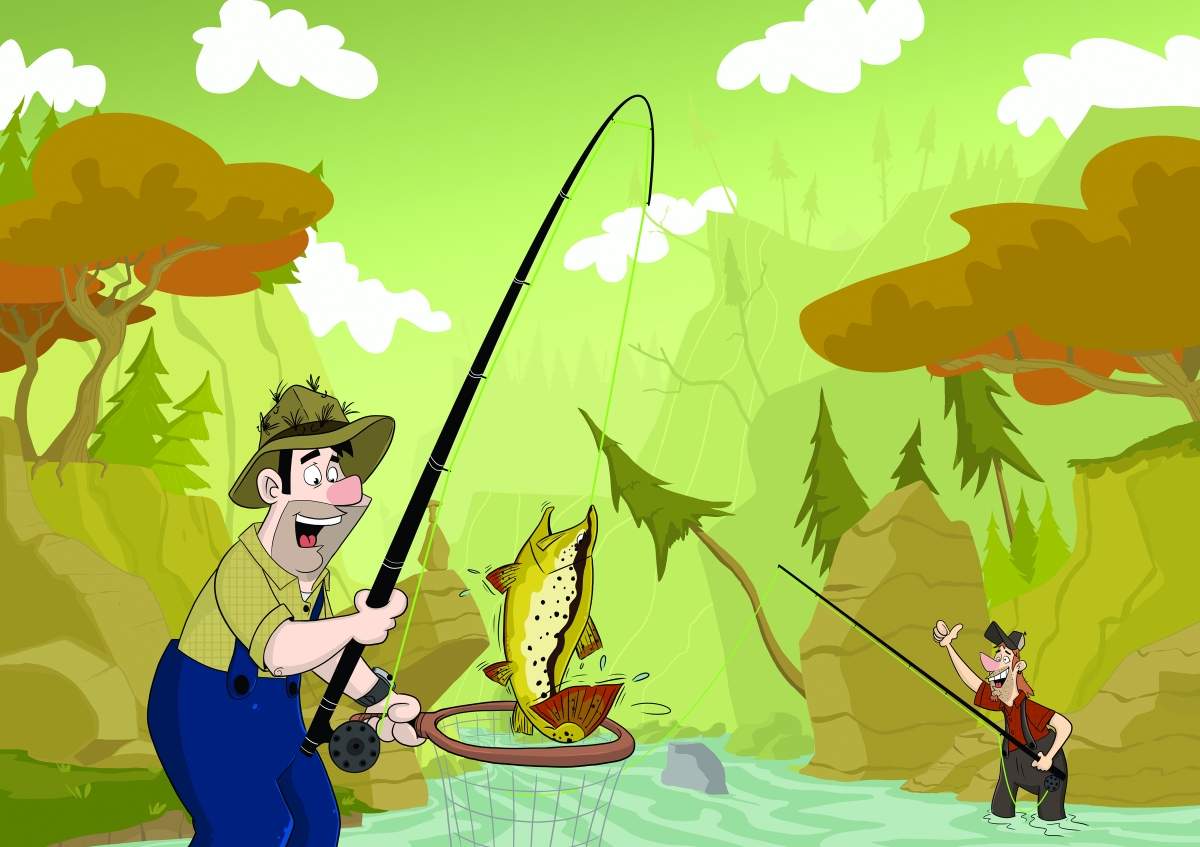
I must’ve given a hoot or holler at some point because Steve is watching from the bank now. I maintain pressure and work the fish into calmer water, and eventually to my net. The brown tapes at 23 inches. I let him relax in the net and snap few quick photos. Even after a fight that seemed to last forever, the brown disappears quickly. We fish until dark, catching our fill of quality trout with the canyon to ourselves. Then the real adventure begins.
Back at the car, Steve asks me if I mind driving. I say no problem before he adds, “I’m schizophrenic and I’ve been hearing voices so I took my meds. I’m not feeling up to driving.” I try to be nonchalant and awkwardly say, “Oh man, that schizophrenia is no fun. I’ll drive, no problem.” This fishing trip just took a turn.
I take my time navigating the canyon and pry a little about Steve’s schizophrenia. He’s dealt with it for a few years and sometimes gets paranoid. Mostly he thinks people are talking about him, sometimes people who aren’t there; he’s never acted out and has managed it with meds.
Soon, I’m making the right onto 84 toward Bozeman. We’re a ways down on the straightaway and I remember how we barely made it up the hills coming west, so I press the pedal firmly to the floor. I’m doing about 85 when Steve says, “Oh NO!”
“What? What?” I ask desperately, thinking he’s having some sort of paranoid episode. “Look in the mirror,” Steve replies. It’s not paranoia; it’s a cop. No big deal, I think, and pull over.
Having been pulled over a number of times in Montana, I figured they’d give us a verbal warning. I give the officer my driver’s license and Steve explains that he doesn’t have the insurance or registration and suddenly my heart drops. Officer Bob, as it turns out, looks skeptical and tells us to wait in the car; before I know it, he’s back at the window.
“John Fedorka, please step out of the car and place your hands on the hood of the car.” I’m in shock. How could this be? I just caught one of the nicest brown trout in recent memory and I’m about to be arrested. The fishing gods are cruel.
I step out of the car, but before I place my hands on the hood of the Mazda, I step away, keeping my hands high and visible. “Officer, why am I being arrested?”
“John, I don’t want to have to taze you,” he says, as he reaches for his side-holstered tazer.
“There’s no reason to taze me. Th-th-there’s no reason to taze me,” I stutter. “We’re just talking. We’re just talking! I’m not going to do anything rash! I just want to know why I am being arrested!”
“I can’t tell you that. I just need you to place your hands behind your head and clasp your fingers together.”
I realize there is no talking my way out of this and so I concede. I place my hands behind my head. The officer tells me to turn around which I do and he takes one hand at a time and places them in hand cuffs, click click. I’ve just been arrested on the Bear Trap.
Officer Bob still refuses to tell me why and questions me about drugs or weapons in the car or on me and why I’m driving a car that’s not registered or insured. “No sir, I do not have any drugs or weapons on me or in the car. My friend is schizophrenic and took medications as a result of hearing voices and asked me to drive as the meds affected his skills to operate the car. I assumed that the vehicle was registered and insured.” I hear the words echo from my mouth and there’s no way the cop is buying this.
“Stay right here,” Officer Bob says. He heads to Steve and fortunately our stories match. The cop asks Steve if he can drive, which at this point he’s able to do. I plead with Steve to follow me; as of this point I have no idea why I’m being arrested or how long I’m going to jail. Steve follows me and the officer helps me in the back of the cruiser. I have my hands behind my back and he drives like a New York City cab driver. I comment on this and he responds with a sharp turn; I slam into the side of the door and he asks, “What’d you say back there?” I mention how tightly he put the cuffs on, but he doesn’t care.
Finally, as we approach Ennis, Officer Bob explains what’s going to happen. I’ll need to post bond and then appear in court within two weeks; if I don’t have money to post bond, I’d stay a part of my sentence in jail. I explain that I don’t have cash and ask the officer if they take debit or credit cards at the jail. They do not.
Great. I’m going to spend a weekend that started so promisingly in jail. I ask Bob if they take third-party checks; they do not. I barter with Officer Bob. “The only thing I have other than my debit and credit cards is a check from my dad for 50 dollars and I really don’t want to spend the night in jail.” Officer Bob says, “There’s a place that’s open that might cash your check.”
I think he’s crazy. What bank is open on a Friday night that will cash my check? My question is soon answered as we pull into Virginia City. Officer Bob pulls in front of the Pioneer Bar and unlocks the doors and lets me out. He gets back in the car and I ask, “Are you coming with me?” He replies quickly, “I’m not going in there.” I think it’s odd that he’s letting a prisoner go by himself, but I walk up the stairs and into the bar with my hands cuffed behind my back and a 50-dollar check from a small Pennsylvania bank clasped between my fingers.
There are about a dozen locals at the bar, well on their way to a good buzz. I think about ordering a cold one with a straw when the bartender asks, “What can I do for you, young sir?” I’m embarrassed and I ask, “There isn’t a chance you could cash a third-party check? You see, I’m in a bit of a bind here.” I rotate my back to show my check and handcuffed hands to the bartender, who responds, “No problem, my friend.” Noticing my fly-dotted cap, he asks, “Catch anything?” I’m in shock; he’s helping me out and cashing the check, and talking fish. Nobody cashes a third-party check, especially not to a trout bum in cuffs. I love Montana, I think to myself.
In no time, the bartender is back with the cash. I’m thanking him over and over again when the locals notice my restrained wrists. One of them asks loudly, “That no-good bastard Bob ain’t out there, is he?” Every patron’s neck snaps quickly in my direction and I hesitate a bit before responding. “Yeah, he is.” I instigate a little, sensing my luck is about to turn. “In fact, he said he didn’t want to bother with a bunch of no-good local drunks, so he’s waiting in the police cruiser.” The saloon erupts.
Madison County is big, but the number of residents is few. Apparently Bob pissed a lot of these guys off. I’d find out later from a guide friend that he had ticketed just about everyone that lives in the area. “Let us take care of him for ya!” they cry. “We’ll take care of that no-good hall monitor prick for ya!”
I’m beginning to think that these guys are actually going to take care of this for me and before I know it, I’m walking proudly with every angry drunk in Virginia City, ready to take care of Officer Bob. They’re yelling and spitting and calling Bob every name in the book, none of which are “Officer.” One of them even throws a half-empty beer can. Bob’s nervous, though not surprised, and in one motion opens the back door, throws me inside, and peels out, leaving the drunken mob in the dust. There’s a new breed of vigilante in Virginia City.
“They didn’t seem to care much for you, Officer Bob.” I say. “Yeah, it’s a small town,” he replies. There wasn’t much more discussion and soon we’re at the Ennis police station, where I’m fingerprinted, photographed, and relieved of my $50. Officer Bob finally fesses up that I have an outstanding speeding ticket. When I get in the car with Steve, I thank him for staying close by.
Two weeks later, I show up the courthouse in Virginia City to pay my speeding ticket and to make sure I’m right with the law. I stop at the saloon for a pint and a shot and to thank the barkeep for cashing the check. Drinks are on the house so I tip him kindly. In the end, it makes for a good story. I later write about it for a college creative writing class—and I surely deserve an A. My professor disagrees, and though there isn’t a single red mark on my paper, she does comment at the end: “My husband fly fishes, too. B-.”

